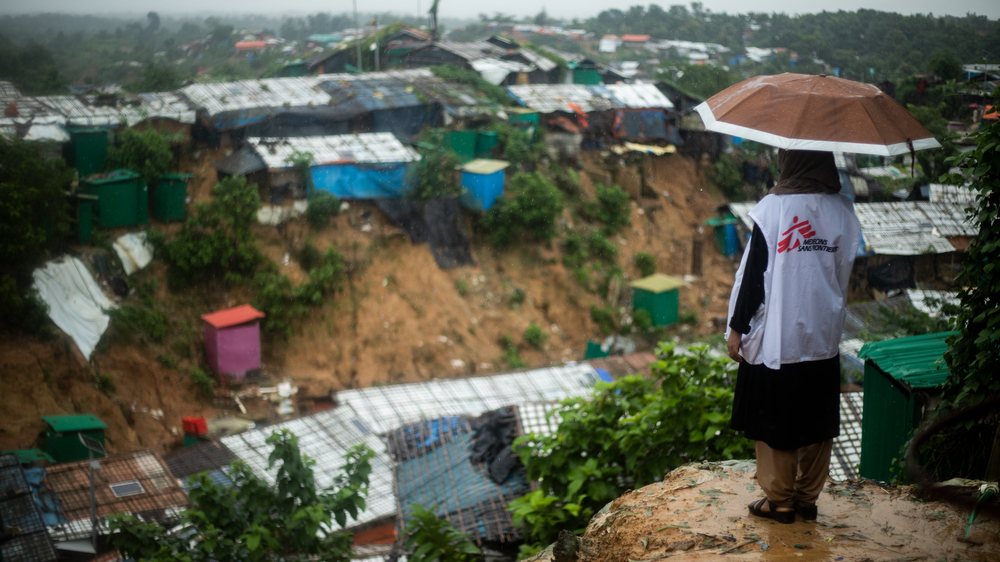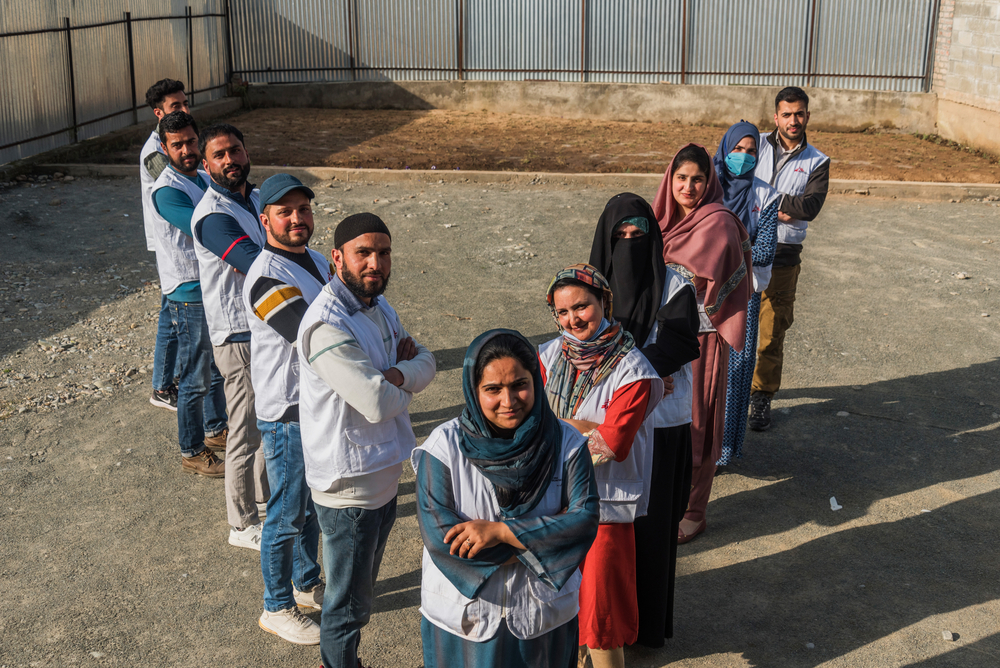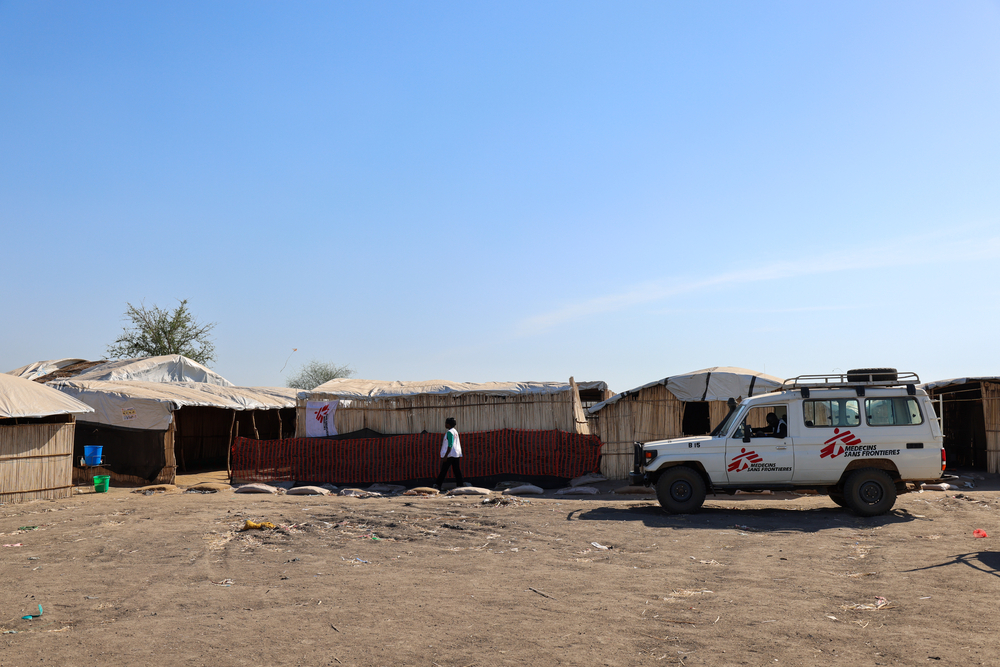Every year MSF sends around 3,000 international field workers to work alongside 25,000 locally hired staff in countries around the world to provide emergency medical assistance to people whose survival is threatened by armed conflict, epidemics, malnutrition, exclusion from health care or natural disasters.
MSF South Asia recruits field workers from:
If you think you fit one of the profiles below, find out what you need to know before you apply, how to apply or see our FAQs.
Heading off on mission with Médecins Sans Frontières is no trivial matter. In addition to using your professional skills, you will need to demonstrate commitment to the populations at risk and respect the values described in the MSF Charter.
The values laid out in the Charter – neutrality, impartiality, non-discrimination, personal commitment, medical ethics and respect for human dignity – are lived and practiced daily, through decisions made by the organisation as a whole and by each of its members individually. We expect MSF staff to understand these values and make them their own.
Before taking the first steps to work with MSF abroad, you should understand the reasons behind your decision. Are you idealising our work, or making an informed decision? Do your motivations and values go hand in hand with MSF’s mission?
It is also important that you understand the day-to-day realities facing MSF employees who often live and work in unfamiliar surroundings, under difficult and stressful conditions. If you want to leave for an MSF mission, we recommend that you read through the sections below. This will help you gain a better understanding of the implications of making this commitment.
When applying to MSF, you need to be aware that we work to improve access to healthcare for vulnerable populations in countries where the following factors can be in play:
For MSF, the safety and security of staff is a priority. You may be asked to live and work in unstable countries where your life could be in danger. For all of our projects, handbooks have been created to limit risks as far as possible.
Working with MSF in the field means representing MSF day and night, every day of the week, even during your free time and on holiday. Everyone is responsible for their own safety and the safety of their team.
Following MSF’s security rules may limit your movements and interactions with the local population outside of working hours. However, it is essential that you understand that your actions, as a member of MSF’s staff, can have an impact not only on the people you are interacting with but also on the MSF project and, as a result, can directly impact upon beneficiaries. As such, it is vital that you follow the rules laid down by MSF. When your working day is over, you may have to observe a curfew and may have to remain within the MSF compound.
When working abroad with MSF, you will have to adapt to many changes, including food, accommodation, daily routine, recreation and language. A new lifestyle is awaiting you, where free time and privacy can be in short supply. You may have to share your bedroom and bathroom. You need to be sure that you can do without normal creature comforts before applying to MSF.
MSF projects can take place in locations where the weather conditions are not always mild (extreme heat or cold, high humidity, heavy rainfall or desert climate). You will also be a long way from your friends and family for several months at a time. Communication can be difficult.
Working in the field requires you to be in good health and have a healthy lifestyle which ensures that you remain so. This is in fact the best way to avoid diseases and to be able to carry out all the tasks required of you. As such, appropriate vaccinations are also essential, as are certain preventive measures (against malaria, for example).
Working in the field with MSF can create a stressful environment. Many factors can contribute to this: completely changing environment, basic living conditions, local food, distance from friends and family, potential health issues, strained relationships between fellow team members, feeling unsafe, frequent project changes and relationships with the local authorities that can be difficult, etc.
Have you asked yourself the following questions ?
Working abroad means leaving your loved ones for a certain period of time, usually between 6 and 12 months. What impact will being away for up to a year have on your private life?
Also consider the impact a difficult working environment will have on your morale. Being assigned to a mission abroad is of course exciting, but the return home can be trying for both you and your family: working in the field leaves its marks.
There are cultural differences and while they can be enriching, they can also lead to misunderstandings. Punctuality at work, relationships with superiors and between men and women can vary between countries.
Being tolerant of people who think and act differently than you is essential. Tolerance and mutual respect are key values within Médecins Sans Frontières.
The issues we have mentioned above are intended to give you an awareness of what working abroad entails. Thousands of people who have worked with MSF over the years have found their experience in the field demanding, but enriching. For many of them, leaving for a mission proved to be a turning point in their life.
Working for MSF is a commitment, rather than just an adventure or a job opportunity.

MSF bases its humanitarian actions on the principles and values included in its Charter. These values, these ideals – neutrality, impartiality, non-discrimination, personal commitment, medical ethics and respect for human dignity – are lived and practiced daily, through decisions made by the organisation as a whole and by each of its members individually.
We are looking for people that want to commit to multiple missions and a long-term career in humanitarian aid. Hiring and training an employee is a major investment for MSF and we want to hire expats who want to grow within the organisation.
Previous experience helps to ensure that skills are of a sufficient level and ensure credibility with local contacts. Internships are not recognised as professional experience.
During conflicts and other violent situations, MSF teams offer healthcare services to the entire population, provide care to refugees and people who have become displaced within their own country.
Given the nature of our mission and the contexts we operate in, we ask that our staff leave for missions without their partner and/or family.
In order to leave with Médecins Sans Frontières, you must be in good health and have received the standard vaccinations (as a minimum, measles, yellow fever, DTP and polio). Depending on which country you are sent to, you may also need to receive additional vaccinations and take preventive measures to avoid certain diseases.

MSF is an association consisting of ‘volunteers’. For MSF, volunteering is an individual commitment and personal responsibility. However, our colleagues work on a paid basis.
We are looking for colleagues who are morally committed to humanitarian action and accept the risks of the mission. They also demonstrate flexibility in their work and accept to be sent abroad according to humanitarian needs. Finally, they respect the MSF Charter as well as the Employee Charter, and must adopt a modest lifestyle during missions.
The management of MSF’s human resources is based on the concepts of volunteering, equity, transparency and recognition of the value of each individual.
MSF salaries reflect the humanitarian spirit of volunteerism, while recognizing the high levels of professional skill of our field staff. Increases are based on expertise and experience. For example, after one year of engagement for MSF the salary increases. MSF offers the opportunity to attend trainings and workshops, organised internally or externally, relating to specific career development or individual growth.

You can apply for a profile that matches your experience and qualifications through an online process.
You will need to complete the online application process and upload your CV and skills list (in case of some profession). Your application will be screened by a Human Resources Officer and you will receive a response within two working weeks of MSF receiving your application. Please note that incomplete application will result in delay in the application process.
After receiving the forms and your CV, we shall give careful consideration to your application. We will assess your overall qualifications, experience, and your motivation to work with MSF. If you are then deemed eligible for further follow-up, we shall contact you to arrange a mutually convenient time for a telephone interview.
Should you be successful in the telephone interview you will be invited to attend an Interview and Assessment Center together with other candidates.
MSF South Asia office organises recruitment and assessment sessions periodically.
Profiles such as Epidemiologist, Logistics, Financial and Human resource also requires a written test. This test is usually combined with the Assessment Center.
MSF has defined a number of competencies that the organisation believes are needed to achieve excellence in our work. Not all competencies are needed for each job and the decision of which competency is needed for each job is based on the specific job profile and also the function and level of responsibility associated with the job. However, there are some competencies that are required for all jobs regardless of the profile, function, and level of responsibility. These are set out below:
During the application screening process, your professional and educational credentials will be verified by an outsourced agency appointed by MSF. All your information will be kept confidential and will only be used for the propose of this evaluation. After completion of the face-to-face interview and successful participation in the assessment day, we will ask for candidate references.
If your interview and assessment (intake procedure) is positive, you will be accepted in the volunteer pool.
After being formally accepted, all new MSF volunteers take a preparatory course that provides further insight into the organisation and the work carried out by MSF. Topics covered during this course include humanitarian emergency aid, safety, stress and cross-cultural communication. This allows you to prepare properly for the mission and gives you an idea of what you can expect on the mission in the field.
Due to the unpredictable nature of humanitarian work and the changing demands for human resources in the field, please consider that even though you may meet the requirements for the role you are applying for, your application may be rejected if we are currently experiencing a low demand for this particular profession. We encourage you to re-apply in the future.
Once you have been matched, the Field HR team will assist you through the various pre-departure procedures, including the booking of flights and assistance with obtaining visas.
You will also have briefings in the Delhi office and, if appropriate, in the operational section prior to your departure to the field, followed by a full briefing on arrival in the field.
MSF also covers certain costs, such as:

No. The majority of our volunteers have a medical or nursing background but we also need skilled support staff. This include:
We are not currently recruiting the following profiles
It is very rare to find two open positions for first mission volunteers in the same project at the same time. Couples may apply at the same time but they should realise that they will probably be working in different countries.
No, the professional teams we send to the field cannot accommodate observers, untrained helpers or others who lack the qualifications and experience to be full participants in the work of the mission. All volunteers working in field projects must go through the normal recruitment procedure.
While there is no rigid limit, a candidate’s chances of selection decrease markedly if they have not worked in their profession within the last two or three years.
Coordination positions are usually filled by experienced MSF staff. Occasionally MSF does recruit Medical, Project and Logistic coordinators. Successful applicants for these positions will have extensive field experience, in a coordination role, with another NGO that carries out similar work to that of MSF, and has similar values. If you feel you have the experience and ability to work as part of a senior management team in the field please contact the HR department.
No, the conditions encountered on field missions demand the full attention of the teams. They do not have the time to supervise, monitor and assess trainees and students. National staff fills all auxiliary positions.
No, you cannot. Only candidates that want to work outside India can apply through this site. If you are interested in working for MSF in India, especially when you have a medical background, you can check the Work in India (Projects) and Work in India (Office) page on our website.
MSF packages reflect the humanitarian spirit of volunteerism as well as recognising the high level of professionals we recruit.
That includes:
1. Round trip economy air travel
2. Accommodation and transportation during your contract (including briefings and debriefings)
3. Monthly indemnity based on your experience and MSF salary structure
4. Field Per diem allowance in local currency based on the cost of living in project country
5. Insurance covering health, luggage, professional liability, repatriation, accidents and flights
6. Pre and post mission health checks
Volunteers are responsible for personal expenses such as the purchase of souvenirs and developing photos and for their own holiday arrangements during and after their contract.
Length of service remuneration which is to cover running costs in their mission and the job required. The usual length of a first mission is between 9 and 12 months. Medical doctors with an availability of only 6 months may be considered. Surgeons and anesthesiologists deployed in acute crises may serve for a period of six weeks or more.
No. All posts for first-time volunteers are unaccompanied. Living conditions in the field and security concerns make it impossible for family members to accompany volunteers. Also, most mission locations do not allow for friends or family members to visit volunteers. Accompanied posts may be offered to coordination staff, depending on field conditions and requirements.
All volunteers must be aware of the risks and dangers of serving with MSF in the field. They must understand that they have no claim against the organization for any injury or illness acquired while participating in any travel or activity conducted by, in support of, or under the auspices of MSF. However, MSF maintains insurance coverage on behalf of its volunteers that provide some direct benefits to injured or sick volunteers (including appropriate care and, if necessary, repatriation) or their beneficiaries.
MSF works in conflict areas and insecure environments but MSF maintains extensive risk-management procedures and security guidelines for every mission. Volunteers are briefed on the country security situation before going to the field, and upon arriving at the project site are given specific security protocols. Adherence to our field guidelines for personal and team conduct and safety is not negotiable.
MSF has no prescribed limit, physical condition is more important than age. As living conditions in the field can be basic, volunteers do need to have the physical and mental fitness to cope with the demanding conditions that may be encountered on a field mission. Some MSF sections have age limitations due to insurance rules.
No. MSF places staff on assignment based on the needs in the field. MSF asks all volunteers to be flexible and willing to serve where they are needed most. However, special skills and/or restrictions are taken into consideration in each placement. Once a position is offered, the final decision to accept a post is made by the volunteer.
No. MSF’s working language is English. Candidates must be able to speak and write in English fluently. Speaking other languages such as French, Spanish, Portuguese, Russian, Arabic can be of added benefit.
It is best to allow for as much time as possible before you are available go to the field. You should leave at least 2 months for recruitment; sometimes it will be longer and sometimes shorter. If your circumstances change after you have applied, you can change your availability date but it is better not to delay it too long after you have been recruited.
The recruitment office starts with investigating if the technical requirements of the candidate are sufficient to work for MSF overseas. For medical and para-medical profiles certificates will be thoroughly checked.
Most non-medical candidates have to undergo a technical or professional test.
If the technical requirements are met, the recruitment officer invites the candidate to take part in an Assessment Center (AC). This is a method to find out (assess) if the candidate meets the minimum requirements for a number of MSF specific competencies.
During the AC the candidate will have a face-to-face interview and a group and individual exercise. The AC can take up to two days.
If you have further questions that are not addressed above please email us:






